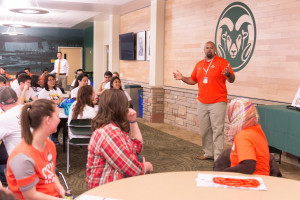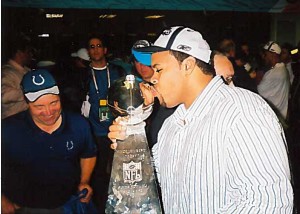As appearing in SOURCE
Senior Associate Athletic Director for Diversity and Inclusion Albert Bimper is being honored with the LeRoy T. Walker Young Professional Award from SHAPE America.
Bimper will be presented with the award Friday, April 8, at the SHAPE America National Convention & Expo in Minneapolis.
The SHAPE America LeRoy T. Walker award is “given to a minority member of SHAPE America who is 40 years old or younger who has demonstrated superior promise in the areas of service, teaching, scholarship and commitment to the goals of the Alliance focusing specifically on under-represented and/or underserved populations and promotion of social justice and diversity,” according to the organization.
About Bimper
As both an assistant professor in the Ethnic Studies Department and the senior associate athletic director for diversity and inclusion in the Athletics Department at Colorado State University, Bimper promotes diversity and inclusion in every dimension of his career. Through his work in the Ethnic Studies Department, Bimper teaches “African Americans in Sports” as well as in the Denver Broncos Sport Management Program. In his teachings, Bimper explains how sport and the world are intertwined, offering the opportunity to have deeper-level conversations about society.
“Sport is a microcosm of the world; it mirrors many political issues, social landscapes and challenges of our society,” Bimper explains. “It is a great opportunity to think about the world around us; we talk about the disparities and inequities that exist. It has been an avenue where we have seen much progress, integration and the advancement of access and opportunity that we see in sport.”
In many ways, Bimper sees himself as a product of this advancement with regard to access for minorities, since he earned the opportunity to experience higher education as a student-athlete.
Along with race relations, Bimper focuses on gender equality, co-directing the Rambition program for the Athletics Department, a program that focuses on fostering the overall personal, professional and leadership development of CSU female student-athletes.
“We do community service projects and networking with women in the community, really honing in on the experience of being a female,” he said. “What is positive, what are the challenges that women need to navigate? We want to have that conversation with them to develop. It’s about empowering these groups.”

Bimper leads many different programs through the Athletics Department, including the John Mosley Leadership Programs, designed specifically for student-athletes of color, eliciting leadership conversations and allowing them to feel welcomed and affirmed in the environment. Mosley was the first African-American athlete to graduate from CSU, in 1943, and went on to become a Tuskegee Airman. “We lean on those kinds of legacies to really shape and develop our athletes,” says Bimper.
Working from his experience, he helps to build these programs knowing that student-athletes’ biggest day isn’t about playing a sport.
“The academic decisions that these athletes make are equally as important,” Bimper explains. “We believe that you can be successful. We didn’t just bring you here because you’re a brother from California and you think you can ball. We brought you here because we think you can be a great student. Ball is just going to be one aspect. That kind of identity reinforcement is necessary, and that’s what I do.”
“We’re having these conversations from day one,” he added. “Day one isn’t the day that the athlete shows up to CSU. Day one is about having the conversation when we’re recruiting the athlete out of high school, letting them know who we are, what we’re about, what we do, what we are going to offer.”
Time at CSU
Bimper is a former CSU student-athlete who played football under one of the school’s most memorable coaches, Sonny Lubick.
“Sonny was my experience,” Bimper recalls. “He was a great leader and mentor and we won a lot. I never planned to go home for Christmas, I always knew I was going to go to a bowl game.”
At the team’s highest point they were ranked 14th in the country.
“Coming here I had won only two games in high school, so I was ready to win,” Bimper said.
Winning is exactly what Bimper did at CSU. Along with being an athlete, Bimper connected with the faculty at CSU and participated in Phi Beta Sigma Fraternity.
“There was more to me than just being a football player,” he said.

Bimper never forgets his roots or the people who have helped him along the way. In his office he has a series of photographs of those who have inspired him throughout his journey, from signing day in high school to the day of his college graduation with his most influential professor, Jeffrey Shears, to kissing the Super Bowl trophy. “From the high school I graduated from, it was a big deal for me to go to college. I keep these old pictures just to remember,” Bimper said.
After college, Bimper played football in the NFL, most notably with the Indianapolis Colts in a Super Bowl XLI win in 2007 alongside Peyton Manning. However, his professional football career was brief, and he went on to earn his master’s from Purdue University and his doctorate from the University of Texas.
LeRoy T. Walker Award
Colleagues Louis Harrison from the University of Texas and Erin Centeio from Wayne State University nominated Bimper for the LeRoy T. Walker Award.
“This award means a lot to me, to lean on his legacy — in a cliché way, to stand on his shoulders. He was an impressive man,” Bimper said of Walker.
Walker was born in segregated Atlanta, the grandson of slaves and the youngest of 13 children. From there he became the first African-American head coach of the men’s track team and then president of the United States Olympic Committee in 1992, during which he saw the Summer Olympics be hosted in his hometown of Atlanta in 1996.
“It’s not only about the personal accomplishments,” Bimper explains, “it’s really about your contribution to better society and the field of research. Sport can create access and opportunity for others. I’m most excited to have my name attached to his. He may not be the most famous person, but you’ll appreciate what he did.”
Outside his office in Eddy there are two quotes, the only things he’s ever put outside his door. One of them reads, “The people who have achieved great things that the world will always remember started by doing powerful things that the world will never know.”
Bimper’s contribution to diversity education, society and the CSU community will be the powerful things people will remember as well.
